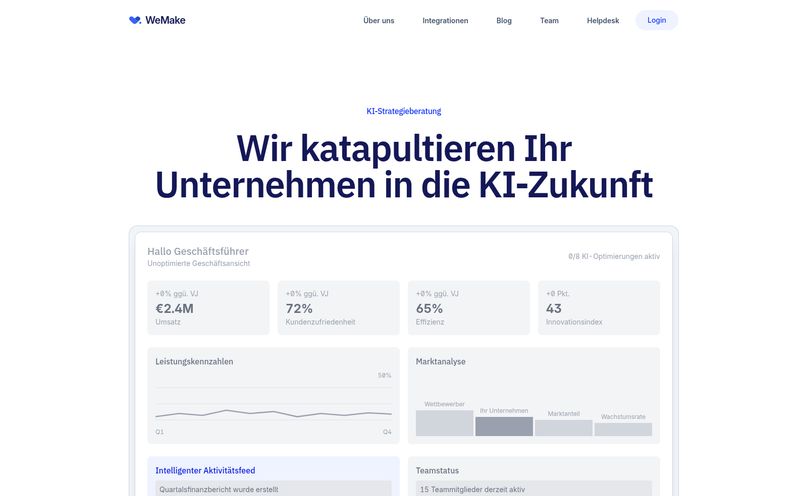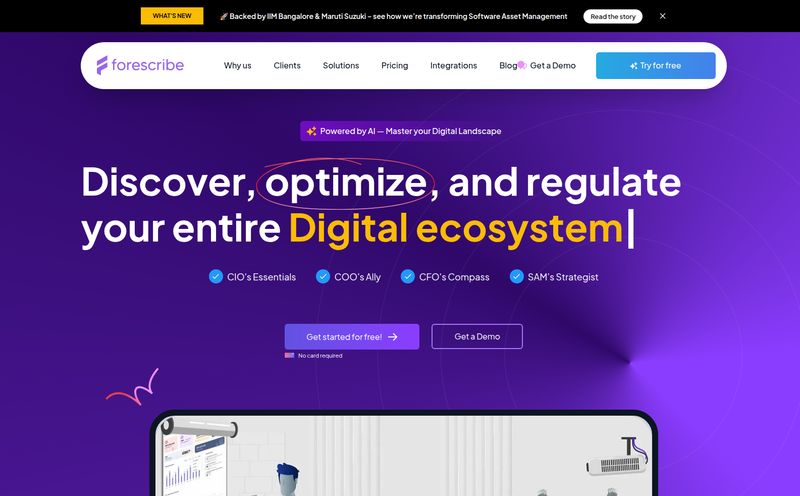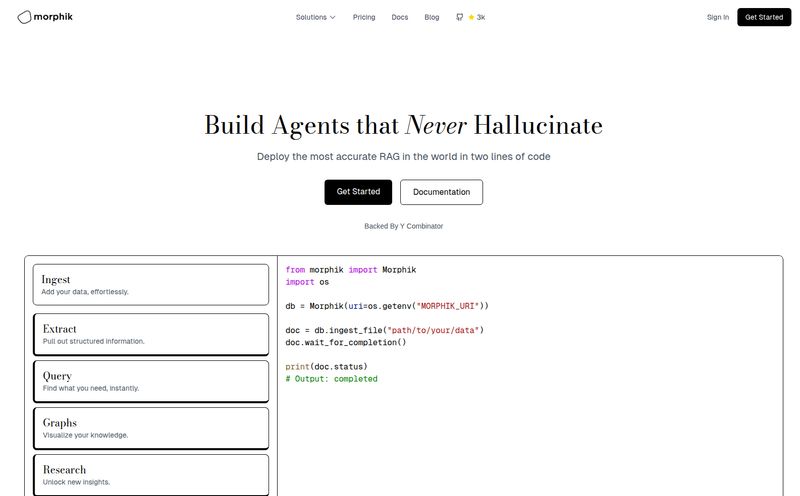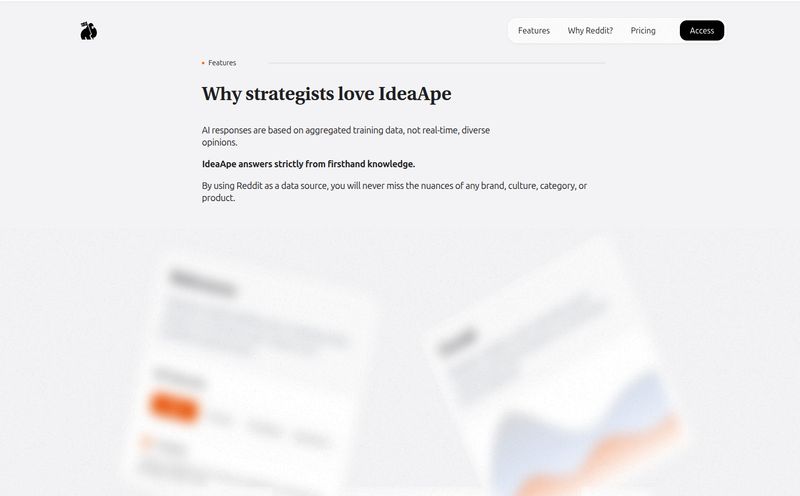Let’s have a frank chat. As someone who’s been neck-deep in SEO, traffic, and digital strategy for years, I’ve seen my share of “game-changing” platforms. They all promise to organize your life, streamline your workflow, and probably make you a better cup of coffee. Most of the time, it's just marketing fluff wrapped around a slightly prettier spreadsheet.
But every now and then, something catches my eye. Something that addresses a pain point so universal, so deeply annoying, that I have to take a look. That pain point? The absolute nightmare of company knowledge being scattered to the four winds. You know what I’m talking about. The final report is in a PDF on one person’s desktop. The key market stats are in a Slack channel from three weeks ago. The project plan is in a Google Doc that only half the team has access to. It’s organized chaos at best, and a productivity-killing black hole at worst.
This is the problem KnowSilos claims to solve. The name alone is pretty on-the-nose, right? It’s not just about storage; it’s about breaking down those invisible walls between departments and data points. So, I decided to kick the tires and see if it could really deliver on its promise of smarter, data-driven decisions.
So, What Exactly is KnowSilos?
Think of KnowSilos as a central brain for your business. It’s a platform designed to suck in all that scattered information from your various tools and documents and, using a bit of AI magic, turn it into something actually useful. Instead of a jumble of files, it creates what they call a “knowledge graph.” That sounds techy, but the concept is simple: it connects related pieces of information, creating a web of intelligence that your whole team can tap into.
Imagine asking a question like, “What were our Q2 sales figures for the Alpha project and what did the latest market research say about our main competitor?” and getting a single, coherent answer pulled from a sales report PDF, a Google Sheet, and a web article. That’s the dream it's selling.
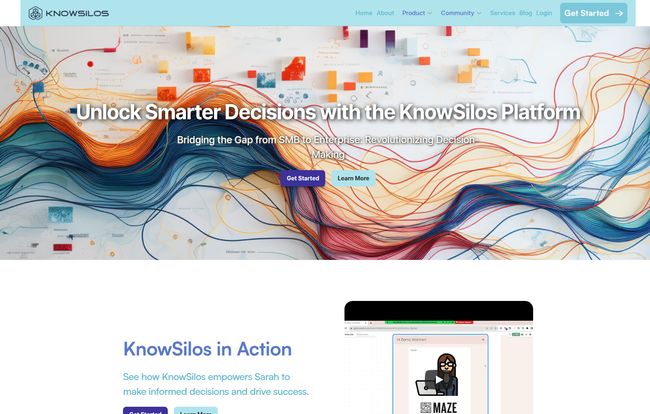
Visit KnowSilos
The Features That Actually Make a Difference
A long list of features is one thing, but which ones actually move the needle? After spending some time with the platform, a few things really stood out to me as being more than just bullet points on a pricing page.
From a Data Junkyard to a Knowledge Library
The core strength of KnowSilos is its ability to integrate and structure data. We all have that one shared drive that looks more like a digital attic than a functional archive. KnowSilos connects to these places and doesn’t just store the files; it understands them. It builds connections between a project brief, the subsequent progress reports, and the final client feedback. Suddenly, you have a narrative, a complete story of your project, not just a collection of disparate files. This shift from disorganized data to a structured knowledge graph is, for me, its most compelling feature.
Your Own Personal PDF Whisperer
I have a personal vendetta against 100-page PDFs filled with dense text where the one stat I need is buried on page 73. It’s a huge time sink. KnowSilos uses Natural Language Processing (NLP) to read and extract information from these documents. You can essentially 'ask' your PDFs questions. No more endless scrolling or Ctrl+F prayers. It pulls out the key takeaways, stats, and insights, presenting them in a digestible format. This alone could save hours every week for research, marketing, and sales teams who live and die by reports.
Collaboration That Isn't Just Another Chat Window
A lot of tools slap a “collaboration” label on a simple comment feature. What’s different here is that the collaboration happens around the data. Teams can discuss insights in real-time, with everyone looking at the same verified information. This puts an end to the classic meeting where everyone shows up with slightly different versions of the data. It fosters decisions based on a shared reality, which is rarer than you’d think. It even helps you pull persuasive visualizations for reports, making it easier to get buy-in from the higher-ups.
My Honest Take: The Good, The Bad, and The Maybe
No tool is perfect. Let's get into the nitty-gritty. I'm not here to sell you on it, I'm here to tell you what it's like from the trenches.
What I Genuinely Like
The biggest pro is the sheer relief of centralization. Having one source of truth changes how a team operates. The frantic search for “that one file” disappears. The ability to pull up-to-date market trends from the web and have them analyzed alongside your internal data is incredibly powerful for staying agile. And the way it transforms a mess of data into structured, actionable insights is legitimately impressive. It makes data feel less intimidating and more like a helpful partner.
A Few Caveats and Considerations
Now, for the reality check. The Freemium plan, while a great way to get a feel for the platform, is definitely limited. You'll hit a ceiling on integrations and the depth of AI insights pretty quickly. It's a solid taster, but not a long-term solution for a growing team. If you're a larger organization needing highly specific solutions or integrations, you're looking at the Enterprise Plan, which comes with custom pricing. That means you’ll have to get on a call with sales, which isn’t everyone’s favorite activity. I get why they do it, but it's a hurdle for teams that just want a price tag.
Breaking Down the KnowSilos Pricing
The pricing structure is pretty straightforward, which I appreciate. It’s a classic tiered model that scales with your needs. Here’s my quick breakdown:
- Free Plan: This is your test drive. You get the basic access, a shared workspace to try with your team, and a taste of the AI insights. The integrations are limited, but it's more than enough to see if the core concept works for you. No credit card needed, so it’s genuinely free to try.
- Plus Plan ($19/mo): For just under twenty bucks a month, this feels like the sweet spot for many small to medium-sized businesses. It includes everything from the free plan but unlocks access to multiple storage locations (super important), better data visualizations, and, crucially, more integrations. This is the plan where the tool really starts to sing.
- Enterprise Plan (Custom Pricing): This is the “all you can eat” buffet. It includes everything from the other two plans plus extensive integrations, dedicated support, and advanced expertise from their team. It's for larger companies with complex data ecosystems and specific security needs. You'll have to contact them for a quote.
Honestly, the $19/mo Plus plan seems very competitively priced for the value it offers, especially for teams drowning in documents and data.
Who is KnowSilos Actually For?
So who should be signing up for the free trial? I see a few key groups.
First, small and medium-sized businesses (SMBs) on a growth spurt. This is the stage where information management often breaks down. KnowSilos can provide the structure they need before things get out of hand. Second, marketing and research teams of any size. The ability to scan reports and pull web data for competitive analysis is a massive time-saver. Finally, any enterprise department that feels siloed from the rest of the company. It can act as a bridge, creating a shared pool of knowledge that benefits everyone.
If you're a solo freelancer who keeps everything neatly organized, this might be overkill. But if you work in a team environment, the value proposition is pretty clear.
Frequently Asked Questions about KnowSilos
- How is KnowSilos different from project management tools like Notion or Slack?
- Think of it this way: Slack is for communication, and Notion is for documentation. KnowSilos is for intelligence. It doesn't just store your data; its AI actively analyzes and connects it to provide answers and insights you wouldn't find on your own. It's less about managing tasks and more about managing knowledge.
- Is the AI difficult to use for non-technical team members?
- From what I've seen, no. The interface is designed to be conversational. You ask questions in plain English. The whole point is to make complex data analysis accessible, so they've done a good job of hiding the complex stuff behind a user-friendly front end.
- What kind of integrations can I expect on the Plus plan?
- While the specific list is always growing, you can expect integrations with common storage platforms like Google Drive, Dropbox, and others. The goal of the Plus plan is to connect to the places your data already lives, so you don't have to manually upload everything.
- Can I trust the data it pulls from the web?
- This is a great question. KnowSilos has a feature for "Data Credibility Sourcing." It means the platform shows you where it got the information from, so you can always check the original source. It's not a black box, which is critical for building data-backed strategies you can actually stand behind.
- Is the Freemium plan genuinely useful?
- It's useful as an extended trial. It lets you and your team experience the core functionality and see the 'aha!' moment when it pulls insights from a document. You will likely feel the limitations, but its a perfect way to validate its potential for your specific workflow before spending a dime.
So, Is It Time to Demolish Your Silos?
Look, no tool is a magic wand. But KnowSilos is one of the more interesting and practical approaches to the data chaos problem I’ve seen in a while. It’s not just another cloud storage folder. It's an active intelligence platform that works to make your collective knowledge greater than the sum of its parts.
If you or your team are constantly wasting time hunting for information or making decisions based on incomplete data, then giving the free plan a spin seems like a no-brainer. You might just find that clear, organized, and accessible knowledge isn't just a myth after all. It might just be waiting behind a login screen.
